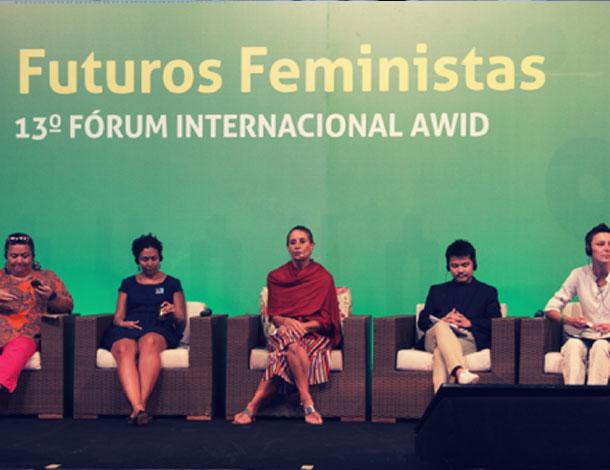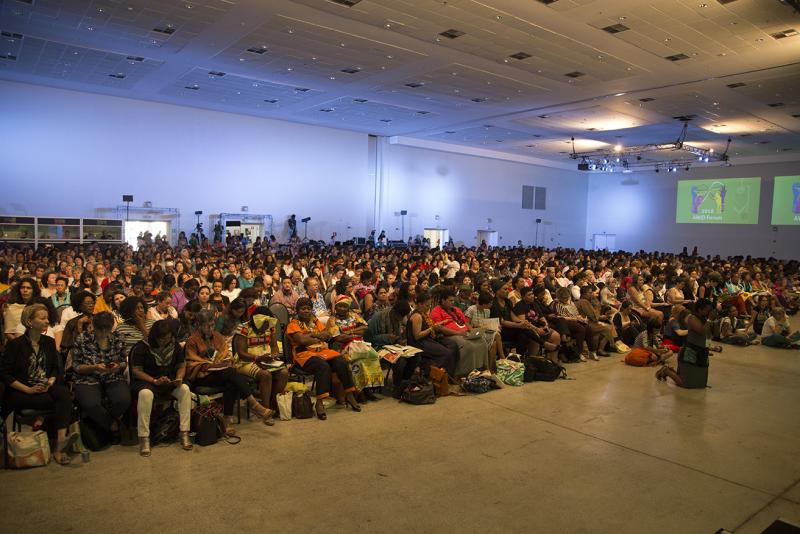- “Tell me what a feminist looks like?”
- “This is what a feminist looks like!”
The “this” in question is a room full of healers, activists, academics, storytellers, truthsayers and high priestesses at the Opening Plenary for the 13th AWID International Forum in Bahia, Brazil. This dynamic conference seeks to highlight the current debates, ideas and political preoccupations of global feminist movements. The theme for this year’s conference is Feminist Futures: Building Collective Power for Rights and Justice, and as the title suggests, the opening plenary set the tone for what is to be a four day feminist lovefest in which we think deeply about the future vision(s) of movements for gender justice at the nexus of multiple issues including class, race, and the environment. At the #AWIDForum, one is immediately struck by the diversity of participants – both across geographical contexts and political priorities; whether it was Trans activists from South Asia, or African feminist writers from across the continent, each participant had a sense of the sensitive times we live in and our need for deep and collective transformation.

Facilitated by Co-Chair of the Sexuality Policy Watch, Sonia Correa, the six-person opening panel consisted of Noelene Nabulivou (DIVA for Equality), Miriam Miranda (Black Fraternal Organization for Honduras), Azra Causevic (Okvir), Awino Okech (London School of Oriental and African Studies), Yara Sallam (Egyptian Initiative for Personal Rights) and Joe Wong (Asia Pacific Transgender Network).
This panel was instrumental in energizing conference participants to “explore the old and new threats to rights and justice and how they are changing, consolidating, or expanding”. To begin, moderator Sonia Correa invited panelists to consider which question they are most eager to explore at the Forum this year. Each participant provided us with a critical discussion of contemporary political struggles in their region.
Egyptian freedom fighter and political prisoner Yara Sallam
asked how we might continue to survive in dangerous political climates – a context in which she is all too familiar with as someone challenging the current Egyptian government. Yara described the ways in which speaking out against current Egyptian President (Abdel Fattah el Sisi) can be cause for lengthy prison sentences. She invited us not to romanticize political struggle and instead seriously consider how we might take care of ourselves and each other within activist movements.
Fijian activist Noelene Nabulivou
asked how do feminist collectives form as political conditions change over time and place. Living in a small-island state, Nabulivou is all too aware of the ways in which both environmental degradation and neo-conservatist state structures impacts traditional ways of living for Fijian people. Added to these oppressive challenges, the activist told us that gender-based violence continues to be prevalent in the region. Noelene asked us to insist that the state re-make itself into a more accountable and just structure. Through “looking at the state of the state”, we begin to understand its impact on various territories: the territory of our bodies, our places and our resources. Within this context, is it still possible to claim that we are in a post-colonial moment? Ultimately, Noelene called on feminist movements to challenge these structures with political love, one in which we speak truth to power and reclaim our geographic autonomies.
I was particularly struck by Bosnian panelist Azra Causevic
who told us of post-war trauma in the Bosnia and Herzegovina region, whereby cultural and ethnic diversity has been manipulated as nationalism is used to commodify the bodies of women and children. As in similar post-ethnic war torn countries, Bosnian ethno national elites have become unified in their struggle for capital. This manifests as an increased militarization and religious conservatism throughout the region. Azra described how a growing religious fundamentalism has targeted Pride marches and social gatherings. They raised the question of how might we heal within the contexts of postwar trauma?
Trans activist Joe Wong
provided us with anecdotal and statistical realities of the average Trans person in Bangkok. He questioned how we currently do feminist activism, particularly around questions of mobility and access. What might a feminist movement look like if it prioritized the mobility and access of Trans bodies? Wong shared stories with us of community members who are not able to move freely within the region, on street corners, in public space without the eminent threat of physical and emotional violence. He also emphasized the invisibility of bisexual and Trans people in Bangkok with the high prevalence of corrective rape.
Honduran activist Miriam Miranda
discussed the realities of living in a post-2009 coup that created conditions which continue to hurt our vision of human rights. She questioned the use of mainstream development models that destroy the social fabric of Honduras, in what she refers to as a “collective suicide plan”. Miranda compelled us to envision a world in which Hondurans do not collectively and culturally die at the hands of “Big D” Development strategies. She asked why we continue to invest in models that are rooted in colonial and imperialist priorities.

African feminist scholar Awino Okech
concluded the panel with a passionate and succinct discussion of the current feminist challenges within the African region. What struck me about Okech’s dialogue was insistence on claiming “Africa” and “Africanness” as a political idea; this comes at a current political moment in which African feminists are being denied their cultural relevance and authenticity. She invited us to consider three major issues for African feminists in 2016. First, the resurgence of a range of right-wing groups and fundamentalists across Africa means that hard-fought and hard-won rights for women are currently being eroded, including services for sexual and reproductive rights. With this rise in religious fundamentalism, Okech argued that the nature of the state is being captured by security forces and increasing militarization as we have seen in other parts of the world.
The second major issue for contemporary African feminists is a neoliberal Development-driven obsession with female entrepreneurship. This economic argument that women are the “next frontier” does not actually challenge women’s current realities nor does it disrupt structural inequality – rather, an entrepreneurship discourse understands women as sources of capital needed to continue feeding our current money system. Okech urged us as feminists to not be coopted by this economic rationalization, but rather continue to march forth with our radically feminist visioning of the world.
Lastly, Okech critiqued the ways in which (African) feminist knowledge production, history and organizing continues to experience a deep erasure, as concepts of gender justice become more mainstream. Books such as Lean In have become more popular than the decades-long work of feminist writers, researchers and academics. Ultimately, Okech called for a re-articulation of feminist principles that does not frame our movements and politics as “too complicated”. Indeed, she recognized that this push towards making feminism more “simple” or readily identifiable, in fact, undermines the complex and intersectional analysis that feminism actually offers OR the nature of feminism itself.
The panel concluded
with a general discussion of the current challenges and potential for growth within global activist spaces. Issues such as climate change, Trans people’s lack of access to institutional spaces and barriers to mobility, and the return of religious dogmas were positioned as top feminist priorities. In continuing to challenge oppressive systems, the panel also encouraged us to centralize self and community care. Yara Sallam discussed the importance of connecting to one’s self and building community-based resources as a way to re-charge or prevent burnout, while Awino Okech talked about how building feminist friendships allowed her to be gentle with herself and challenge the idea that feminism is a destination, rather than a tool and process of social change.
The opening plenary of the 13th AWID Forum provided a cross-section of engaged activists that compelled participants to consider what their feminists futures might look like.
